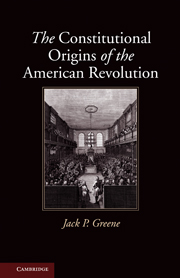1 - Empire negotiated, 1689–1763
Published online by Cambridge University Press: 05 June 2012
Summary
Throughout the first century and a half of the British Empire, the precise constitutional relationship between the colonies and the metropolitan state remained unsettled and subject to continuous negotiation between colonial polities and metropolitan authority. “The chiefest Thing wanting to make the Inhabitants of these Plantations happy,” an anonymous Virginian told his English readers in 1701, “is a good Constitution of Government.” By a good constitution, he explained, he meant one that would not only settle the nagging questions of “what is Law, and what is not in the Plantations” and “how far the Legislative Authority is in the Assemblies of the several Colonies” but also settle them in such a way as to leave the colonies with “a Just and Equal Government.” Such a constitution, he insisted, was necessary to guarantee the colonists the equal and impartial administration of justice and the full enjoyment of “their Liberties and Estates” that were the proud distinguishing marks of Englishmen whether they remained at home or lived in distant colonies. But the Crown’s continuing claims for “a more absolute Power in the Plantations than in England” meant that the colonists would never be able to extract such formal and explicit guarantees from metropolitan authorities. That “a Regular Settlement” of this question had “never yet been made,” that, as another writer phrased it, the precise “bounds between the chief power and the people” in the colonies, between metropolitan authority and colonial rights, had never been explicitly settled, left the British–American world with two competing definitions of the constitutional situation within the expanding British Empire and remained a source of deep anxiety for both colonial leaders and metropolitan authorities.
Crown and Colonies
Although the colonists never succeeded in persuading Crown officials in London to establish a “regular Constitution of Government” for the British Empire that explicitly and formally put the colonists on an equal footing with Englishmen with respect to their liberties and property, in actual practice, a variety of factors mitigated the Crown’s claims for greater authority in the colonies than it exercised in Britain. These included distance, inherited traditions of governance, metropolitan reluctance to commit substantial resources to colonial governance, and the extraordinary economic success of the empire.
- Type
- Chapter
- Information
- The Constitutional Origins of the American Revolution , pp. 19 - 66Publisher: Cambridge University PressPrint publication year: 2010



